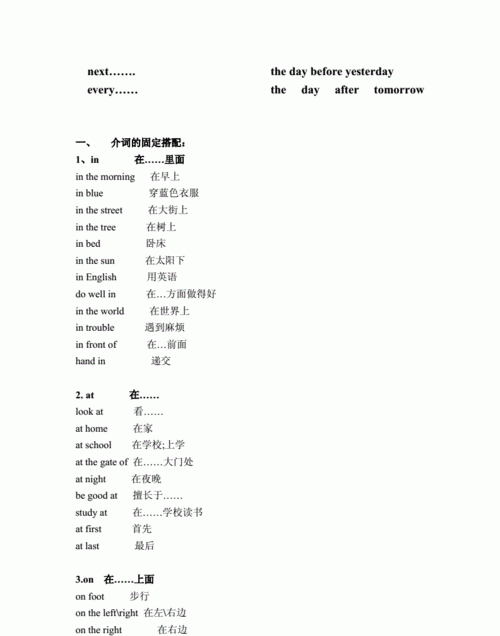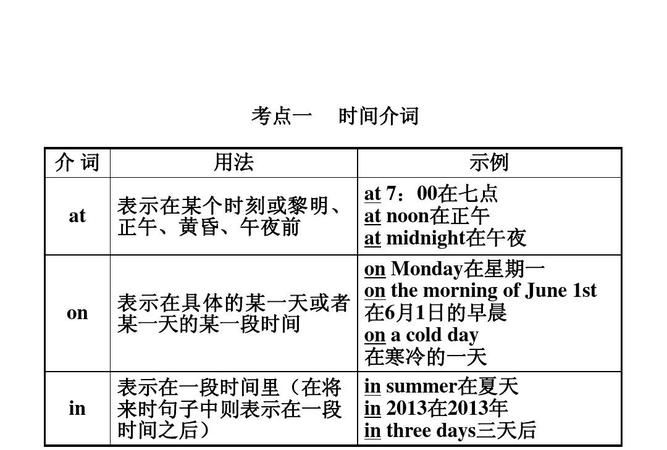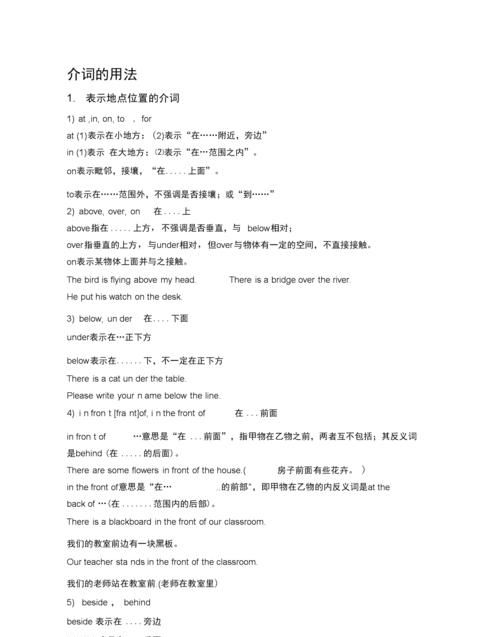本文目录
什么是介词
一、概念:
介词是一种用来表示词与词, 词与句之间的关系的词。在句中不能单独作句子成分。介词后面一般有名词代词或相当于名词的其他词类,短语或从句作它的宾语。介词和它的宾语构成介词词组,在句中作状语,表语,补语或介词宾语。并且在定语从句“介词+whom/which”的结构中,不能用that 代替whom/which。She is a good student from whom we should learn.
二.相关知识点精讲
介词口诀:自从以当为按照,由于对于为了到;和跟把比在关于,除了同对向往朝;用在名词代词前,修饰动形要记牢。
1.表示地点位置的介词
1)at ,in, on, to
at (1)表示在小地方; (2)表示“在……附近,旁边”
in (1)表示 在大地方; (2)表示“在…范围之内”。
on 表示毗邻,接壤,“在……上面”。
to 表示在……范围外,不强调是否接壤;或“到……”
2)above, over, on 在……上
above 指在……上方,不强调是否垂直,与 below相对;
over指垂直的上方,与under相对,但over与物体有一定的空间,不直接接触。
on表示某物体上面并与之接触。
The bird is flying above my head.
There is a bridge over the river.
He put his watch on the desk.
3)below, under 在……下面
under表示在…正下方
below表示在……下,不一定在正下方
There is a cat under the table.
Please write your name below the line.
4)in front of, in the front of在……前面
in front of…意思是“在……前面”,指甲物在乙物之前,两者互不包括;其反义词是behind(在……的后面)。
There are some flowers in front of the house.(房子前面有些花卉。)
in the front of 意思是“在…..的前部”,即甲物在乙物的内部.反义词是at the back of…(在……范围内的后部)。
There is a blackboard in the front of our classroom.
我们的教室前边有一块黑板。
Our teacher stands in the front of the classroom.
我们的老师站在教室前.(老师在教室里)
5)beside,behind
beside 表示在……旁边
behind 表示在……后面
2.表示时间的介词
1)in , on,at 在……时
in表示较长时间,如世纪、朝代、时代、年、季节、月及一般(非特指)的早、中、晚等。
如 in the 20th century, in the 1950s, in 1989, in summer, in January, in the morning, in one’s life , in one’s thirties等。
on表示具体某一天及其早、中、晚。
如on May 1st, on Monday, on New Year’s Day, on a cold night in January, on a fine morning, on Sunday afternoon等。
at表示某一时刻或较短暂的时间,或泛指圣诞节,复活节等。
如at 3:20, at this time of year, at the beginning of, at the end of …, at the age of …, at Christmas, at night, at noon, at this moment等。
注意:在last, next, this, that, some, every 等词之前一律不用介词。如:We meet every day.
2)in, after 在……之后
“in +段时间”表示将来的一段时间以后;
“after+段时间”表示过去的一段时间以后;
“after+将来点时间”表示将来的某一时刻以后。
3)from, since 自从……
from仅说明什么时候开始,不说明某动作或情况持续多久;
since表示某动作或情况持续至说话时刻,通常与完成时连用。
4)after, behind 在……之后
after主要用于表示时间;
behind主要用于表示位置。
时间名词前介词用法口诀
年前周前要用in
具体日子却要禁
遇到几号要用on
上午下午又是in
要说某日上下午
用on换in记清楚
午夜黄昏用at
黎明用它也不错
at用在时分前
说“差”可要用上to
说"过''要用past
3.表运动方向的介词:
across, through 通过,穿过
across表示横过,即从物体表面通过,与on有关;
through穿过,即从物体内部穿过,与in有关。
4.表示“在……之间”的介词:
between, among
between指在两个人或两个事物之间;
among指在三个或三个以上的人或事物之间。
5.表示其他意义的介词
1)on ,about 关于
on 表示这本书,这篇文章或演说是严肃的,或学术性的,可供专门研究这一问题的人阅读;
about表示内容较为普通,不那么正式。
2)by, with, in 表示方法、手段、工具
by 以……方法、手段或泛指某种交通工具;
with 表示用 …工具、手段,一般接具体的工具和手段;
in 表示用…方式,用…语言(语调、笔墨、颜色)等;
3)except, besides 除了
except 除……之外,不包括在内;
besides 除……之外,包括在内。
Except Mr. Wang, we went to see the film.(王先生没去)
Besides Mr. Wang, we also went to see the film.(王先生也去了)
其它常用介词
介词在英语词汇中所占比例很小,但它们的用法却非常灵活,复杂。下列为常用介词及含义:
1)about 关于,附近,大约,周围,随身.
I have bought a book about Shakespearean.
我买了一本有关莎士比亚的书。
There are about fifteen trees in the picture.
图片里大约有十五棵树。
2)above 在....上,高出,以上,超过,在...上游.
The plane is flying above the clouds.
飞机在云上飞行。
I think the man is about sixty years old.
我想那人有六十多岁了。
3)across 横过,对面,交叉,在...的对面.
Can you swim across the river?
你能游过河吗?
We live across the street.
我们住在街的对面。
4)after 在...后面,依照.
He went home after school.
他放学后就回家了。
Read after me, please.
请跟我朗读。
5)against 撞到,靠着,反对,违背,
The car hit against the tree.
汽车撞了树。
He is standing against the wall.
他靠墙站着。
6)along 沿着,顺着.
They are walking along the river.
他们沿着河行走。
7)among 在...当中.(三者或三者以上)
He is the tallest among them.
他是他们当中个子最高的。
8)around 在...的周围,在...那一边.
They sat around the table talking the news.
他们绕桌而坐谈论新闻。
There is a drugstore around the corner.
拐角处有一家药店。
9)as 作为.
He doesn't like people treat him as a child.
他不喜欢人们把他当小孩子对待。
10)at 在...时刻,在...点钟,在...岁时, 向,在...之中,按...速度,值(卖)...钱, 在...(强调地点)
He always gets up at six in the morning.
他时常早上六点钟起床。
He shot at the bird but missed it.
他向鸟射击,但是没射中。
The car goes at eighty miles an hour.
汽车以每小时八十公里的速度行驶。
11)before 在...的前面(位置),在...之前(时间)
He took a picture before the car.
他在汽车前照了张照片。
He can't finish his work before supper.
晚饭前他完不成工作。
12)behind 在...的后面(位置), 落后于,不如,
迟于,晚于(时间)
Are there any brooms behind the door.
门后有扫帚吗?
All of us are behind him in mathematics.
我们数学都不如他。
13)below 在...之下,低于,
There are four lights below the ceiling.
天花板下面有四盏灯。
The murderer run away below the police's eyes.
杀人犯从警察眼皮底下跑了。
14)beside 在...的旁边,在...之外,与...相比.
He found the body beside the river.
他在河边发现了尸体。
Beside yours, my computer is too slow.
与你的计算机速度相比,我的就慢多了。
15)besides 除...之外, 还有...
We are all here besides Bowe.
除鲍外,我们也都来了。
16)between 在...两者之间,
The relations between the two countries has improved since then.
两国的关系从那以后得到了改善。
17)beyond 在...那边,
The shop you are looking for is beyond the street, you can't miss it.
你要找的商店在街的那边,你不会找不到的。
18)but 除去.
He has nothing but money.
他除钱以外什么都没有。
19)by 被..., 在...的近旁 , 在...之前, 不迟于, 以...为手段。
The classroom was cleaned by the students.
教室由学生们打扫干净了。
Miss Lucy came to China by air.
露西小姐是乘飞机来中国的。
20)down 沿着...望下。
She walked down the street.
她沿着街道走。
21)during 在...期间,在...时候。
During the holiday, we went to the south.
我们假期去了南方。
22)except 除...之外。
He knows nothing except English.
他除英语以外什么都不知道。
23)for 为..., 因为..., 至于... 。
He works for this company.
他为这家公司工作。
She came back to the classroom for she had left her books in the classroom.
她返回到教室是因为把书留在了那里。
24)from 从..., 来自..., 因为...。
Where are you from?
你是哪里人?
He died from an accident.
他死于一场事故。
25)in 在..., 在...之内,从事于..., 按照..., 穿着...。
He was born in 1992.
他生于1992年。
I could finish the program in two weeks.
我可以用两周时间完成这个项目。
He spend less time in reading.
他读书时间很少。
The man in black jacket is our teacher.
穿黑夹克的那个人是我们的老师。
26)like 象...,如同...。
The twins are like their father.
双胞胎像他们的父亲。
27)near 靠近....。
There are some flowers near the house.
房子附近有一些花。
28)of ...的,属于...。
This is a map of China.
这是一张中国地图。
29)off 离开...,在...之外。
The young man got off the train quickly.
那个年青人很快下了火车。
I live in a village a little way off the main road.
我住在离大路不远的一个村庄里。
30)on 在...之上。
My book is on the table.
我的书在桌子上。
31)out of 从...出来,在...之外。
The dog run out of the house.
狗从房子里跑出来。
32)outside ... 外边.
They are waiting outside the gate.
他们在门外等着。
33)over 在...之上,遍于...之上,越过...。
There is a light over the desk.
桌子上方有盏灯。
He is over sixty years old.
他有六十多岁。
34)past 越过...,过...,超越...。
The students walked past the post office.
学生们走过了邮局。
It is ten past two.
现在是两点十分。
35)round 围着...,绕过...,在...周围。
We sat round the table.
我们围着桌子坐下。
The earth goes round the sun.
地球绕着太阳转。
36)since 自... 以后,自...以来。
He has made great progress in English since he came into the college.
从他来到大学后,他的英语有了很大进步。
37)through 经过...,穿过...。(立体层面)
They went through the forest.
他们穿过了森林。
38)throughout 遍及...,在各处。
The police searched for the criminal throughout the mountain.
警察搜山寻找犯人。
39)till 直到...,在...以前。
He didn't come back till eleven o'clock.
他直到十一点钟才回来。
We'll be home till six.
六点以前我们都会在家。
40)to 到...,向...,趋于。
How long is it from here to the station?
从这儿到车站有多远?
41)under 在...之下,低于。
There are some footballs under the bed.
床底下有几颗足球。
These students are under seventeen years old.
这些学生们不到十七岁。
42)until 直到,在...以前,
Please wait for us until we come back.
请等着我们回来。
It was not until last week that I handed in mathematics paper.
直到上周,我才交了数学论文。
43)up 在...上面,在...上。
He went up the stairs.
他上了楼梯。
44)upon 在...之上,迫近...。
It's not polite to look down upon him.
蔑视他是不礼貌的。
45)within 在...之内。
You must finish the work within two weeks.
你必须两周内完成这项工作。
46)without 没有,不,在...之外。
We can't do it better without your help.
没有你的帮助,我们就做不好。
We couldn't live without air and water.
没有空气和水,我们就不可能生存。
[编辑本段]介词英文缩写:
介词英文缩写是prep.是英文prepostion的缩写
[编辑本段]介词用法口诀
早、午、晚要用in,at黎明、午夜、点与分。
年、月、年月、季节、周,阳光、灯、影、衣、冒in。
将来时态in...以后,小处at大处in。
有形with无形by,语言、单位、材料in。
特征、方面与方式,心情成语惯用in。
介词at和to表方向,攻击、位置、恶、善分。
日子、日期、年月日,星期加上早、午、晚,
收音、农场、值日on,关于、基础、靠、著论。
着、罢、出售、偷、公、假,故意、支付、相反,准。
特定时日和"一……就",on后常接动名词。
年、月、日加早、午、晚,of之前on代in。
步行、驴、马、玩笑on,cab,carriage则用in。
at山脚、门口、在当前,速、温、日落、价、核心。
工具、和、同随with,具有、独立、就、原因。
就……来说宾译主,对、有、方状、表细分。
海、陆、空、车、偶、被by,单数、人类know to man。
this、that、tomorrow,yesterday,next、last、one。
接年、月、季、星期、周,介词省略已习惯。
over、under正上下,above、below则不然,
若与数量词连用,混合使用亦无关。'
beyond超出、无、不能,against靠着,对与反。
besides,except分内外,among之内along沿。
同类比较except,加for异类记心间。
原状because of,、 owing to、 due to表语形容词
under后接修、建中,of、from物、化分。
before、after表一点, ago、later表一段。
before能接完成时,ago过去极有限。
since以来during间,since时态多变换。
与之相比beside,除了last but one。
复不定for、找、价、原,对、给、段、去、为、作、赞。
快到、对、向towards,工、学、军、城、北、上、南。
but for否定用虚拟,复合介词待后言。
ing型由于鉴,除了除外与包合。
之后、关于、在......方面,有关介词须记全。
in内to外表位置,山、水、国界to在前。

介词的意义
介词(preposition 简写prep.)又称作前置词,表示名词、代词等与句中其他词的关系,在句中不能单独作句子成分。介词后面一般有名词、代词或相当于名词的其他词类、短语或从句作它的宾语,表示与其他成分的关系。介词和它的宾语构成介词词组,在句中作状语,表语,补语,定语或介词宾语。同时介词的用法也很灵活,同一个介词可以表达多种意义,介词可以分为时间介词、地点介词、方式介词、原因介词、数量介词和其他介词。
介词一般用于名词或者代词前面,表示该词与句中其他成分的关系。介词后面的名词或代词称为介词宾语。希望我的回答能帮助到你,谢谢

英语介词如何区分
一、介词不仅具有重要的表达意义的功能,而且在使用上也十分复杂。造成这种复杂现象的原因是多方面的。
1、单个介词(即由一个词语构成的介词,与此相对的是复合介词,比如upon,into,within,without等)本身的意义具有相当的复杂性,以in和on为例,in的基本意义是"在里面",表示一种范围,on的基本意义是"在上面",表示两种东西相接触,然而在speak in English(用英语说)和on the team(在队里当队员)两种形式中,in和on表达的则是引申意义;the boat on the lake指的是"湖上的船",但the cottage on the lake则表示"湖边的小屋"。
2、英语中的单个介词虽然只有60个左右,但这些介词却可以同其他词类灵活搭配,构成为数众多的短语形式:
a、介词加名词构成的短语,由称介词短语。
如by accident(偶然地),on purpose(故意地),for example(例如)in conclusion(总之)等。
b、由名词加介词构成的短语。
如concern for(对……的关心),love for(对……的热爱),satisfaction with(对……满意),confidence in(对……的信任),loyalty to(对……的忠诚)等等。
c、由动词加介词构成的短语。
如insist on(坚持要……),differ from(不同于,区别于),distinguish between(区别,区分),benefit from(从……得到益处,受益于……),conform to(符合)等等。
d、由形容词加介词构成的短语。
如be keen on(对……很热衷),be worried about(为……而担心),be fond of(喜欢),be strict with(对……很严格),be loyal to(终于……)等等。
上述这些搭配形式大都具有固定性,运用时常常来不得半点差错。比如be interested只能和in搭配构成介词短语,according和instead只能分别与to和of搭配构成两种短语介词。
此外,英语中还有一类短语介词,也即由介词加其他此类构成的短语,但作用相当于一个介词,比如in front意思接近before,in spite of和despite是一个意思,apart from和意义也很相近等等。
短语介词还有很多,再如according to(根据),along with(随同……一起),because of(由于),by means of(依靠),instead of(代替),in accordance with(与……一致,依据),on behalf on(代表),owing to(由于),together with(和……一起),with regard to(关于),as for(至于),as to(至于),in view of(鉴于),for the sake of(为了……),on account of(由于)等等。
最后,单个介词还可以用在一起,这种现象称为双重介词,比如from within(从……里边),from behind(从……后边),from inside(从……里边),from outside(从外边)等等。
3、同一个介词和不同的词语搭配或者同一个词语和不同的介词结合都可以产生不同的意义,前者如be good at(善于),be bad at(不善于),后者如agree with sb.(同意某人),agree on sth.(同意某事);在有些情况下,同一个介词和不同的词语搭配或者同一个词语和不同的介词结合有时也能产生相同的意义,前者如depend on(依靠),rely on(依靠),count on(依靠),后者如be good at(善于),be skillful in(善于)。
4、有些结构用不用介词意义完全相同,比如consider后面的as就可以省略而意义不发生变化,而在有些结构中,有无介词意义则不完全相同,比如《红楼梦》中的刘姥姥初进大观园时会说:It is beautiful in here. 而贾府的丫鬟则会应酬说:Yes, it is beautiful here. 刘姥姥的话含有一种对比意义,即大观园和外面相比简直是两个世界,丫鬟已在贾府住习惯了,因此她的话就没有这种对比意义,所以刘姥姥就用了带有比较意义的in here,而贾府的丫鬟则用了没有对比意义的here。
二、除上面提到的几点外,英汉语不同的表达习惯也增加了介词学习的复杂性,比如英语说in the sun, in the moon,汉语则说"在阳光下"(英语的under the sun是"普天之下"的意思)、"在月光下";英语说The sun rises in the east and sets in the west,汉语则说"太阳从东方升起,从西方落下",或者不用介词,干脆说成"太阳东升西落";英语中的the hole in the wall, the nail in the wall, the map on the wall三个短语中用了不同的介词,而汉语则都用一个"上"字来表达:墙上的洞、墙上的钉子、墙上的地图;汉语可以直接说打某人的某个部位,英语则要先说打某个人,然后再通过介词去打某个部位:beat sb. on the head(打某人的头),同样,英语要说抓着某人某个部位,就得先说抓着那个人,然后再用by来表示被抓着的部位grasp sb. by his hand(抓着某人的手);英语中有besides和except两个词语,汉语可以用"除了"一种形式来表达,但汉语的"除外"既可以指包括,又可以指排除,在这两种不同的情况下,英语就得分别用两个介词来表示:
We all went there besides John. 除了约翰我们也去了那里。(即约翰去了,我们也去了)
We all went there except John. 除了约翰我们都去了那里。(即我们都去了,但约翰没去)
最后,为了解释英语介词用法上的复杂性和灵活多样性,特以from一词为例来作进一步的说明。
1.表示纯粹的分离,作"分开"、"分离"、"隔开"、"离开"解,常构成下列表达形式:
separate the good from the evil(把好的和坏的分开)
remove from the city to the countryside(从城市移居乡村)
part from a friend(断交)
depart from one's hometown(背井离乡)
keep away from dangerous things(远离危险)
flee from prison(逃离监狱)
keep (stand. aloof from the society(离群索居)
2.表示"消失"、"消除":
The plane soon disappeared from sight. 飞机很快消失不见了。
After hearing this, the smile fled from her face. 听到这里,她的笑容立即消失了。
3.表示"禁止"、"戒除"、"免除"、"解除"、"除去"、"使免除"、"使脱离"等,有时具有否定意义,常构成下列表达形式:
remove dirt from a table(除去桌子上的灰尘)
release sb. from his suffering(解除某人的痛苦)
clear the land from trees(伐去地上的树木)
free sb. from debts(免去某人的债务)
dismiss sb. from his service(解除某人的职务)
expel (dismiss) a student from school(开除学生)
be excused from punishment(被免去处罚)
be safe from danger(没有危险)
rescue a person from danger(救人于危难)
deliver a person from danger(救人于危难)
4.表示"防止"、"阻止"、"阻碍"等,有时具有否定意义,常构成下列表达形式:
prevent sb. from doing sth.(防止、阻止某人做某事)
keep sb. from doing sth.(阻止某人做某事)
stop sb. from doing sth.(阻止某人做某事)
hinder sb. from doing sth.(妨碍某人做某事)
prohibit sb. from doing sth.(禁止、阻止某人做某事)
5.表示"不在"、"缺席"等:
be absent from a class(缺课) absent oneself from class(缺课)
be away from home(不在家) stay away from a place(不在某个地方)
6.与protect, guard, shelter, defend等动词搭配表示"保护":
An umbrella protects us from rains. 伞可以使我们不受雨淋。
The big tree sheltered them from the rain. 大树保护他们没有被雨淋湿。
7.表示"隐藏"、"隐蔽"、"隐瞒"等,常与hide, conceal等动词搭配:
As a student, you should have no secret from you teachers. 作为学生,你不应该有任何隐瞒老师的事。
The house was hidden from view by the trees. 那座房屋被树遮着了。
He always tries to conceal his poverty from others. 他总是设法不让别人知道自己的贫困。
8.与tell, know, distinguish, discriminate, differ, different等词语搭配表示"区别":
Chinese differs (is different) from Japanese in many ways. 汉语和日语在许多方面存在着差异。
It's not easy to tell a true friend from a false one. 辨别真假朋友不是件容易的事。
How would know an Englishman from an American? 你是怎么分辨英国人和美国人的?
You must learn to distinguish good from evil. 你必须学会辨别事情的好坏。
A little baby usually cannot discriminate one thing from another. 婴儿通常不能分辨两种东西。

介词怎么用
介词一般用于名词或者代词前面,表示该词与句中其他成分的关系。介词后面的名词或代词称为介词宾语(如果是人称代词,则要用宾格)。介词和介词宾语合在一起构成介词短语。
主要用途:
1、表示在某时间的常用介词:at,on,in等。
2、表示期间的常用介词:during,for,over,within,throughout,from和to等。
3、表示其他时间概念的介词:before,after,since,until,till,between,up to等。
4、作为表语时,英语介词可以表示正在“进行”的动作。
5、表示“方法 ,手段”的介词常用by,with,through等。
6、不及物动词不能够直接跟宾语,且没有被动语态。但是和介词搭配后,不及物动词不但可以跟宾语,也有了被动语态。

扩展资料:
一、介词分类
1、按构成分
介词又称作前置词,表示它后面的名词或代词(或相当于名词的其他词类、短语或从句)与其他句子成分的关系。介词通常位于名词或代词之前。
1)简单介词
包括in,on,with,by,for,at,about,under,of等。
2)合成介词
包括into,within,throughout,inside,outside,without等
3)短语介词
一个或两个简单介词和一个或几个其他词类构成一个短语,作用相当于一个介词,这就叫做短语介词。这类介词的末尾总是一个简单介词:
如according to,because of,by means of,in addition to,in front of, in spite of等。
4)分词介词
有极少数介词的词尾是“-ing”,形似现在分词(其中也有些可做分词)。
常用的有:considering,regarding,respecting,including。
2、按词义分
表示“地点(包括动向)”的有:about around(在...附近、周围),above(高于、在...斜上方),across(在...对面、横过)。
二、常用介词辨析
at, in, on
1、at,in和on都可表示时间。at通常指确切的某个时刻,如at six o'clock;in通常表示一天的某一部分,如in the morning〔evening,afternoon〕; on则具体说明哪一天的上午或下午,如on Monday mornin,on a summer's day。
在谈论节日时,at通常指整个的节〔假〕日,不只指一天,如at Easter 在复活节,at Christmas 在圣诞节;on可具体指节日的某一天,如on Easter Monday 在复活节后的星期一,on Christmas Day 在圣诞节(那天)。
在谈论月份、季节、年份或世纪时,通常用介词in,如in the eighteenth century 在18世,,in summer 在夏天,in March 在三月,in 1985 在1985年。
2、at,in和on都可表示地方、位置。at多用于指空间某一点;in用来指有大小、体积和幅度的一个地方或位置。
3、at the weekend 在周末(英国用法);on the weekend 在周末(美国用法)。
以上就是关于介词的意义及用法 ,什么是介词的全部内容,以及介词的意义及用法 的相关内容,希望能够帮到您。

